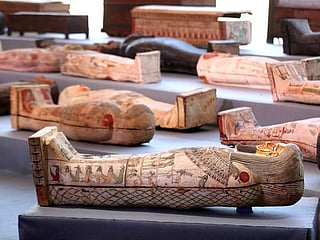Mohamed Bin Zayed holds talks with Al Sissi in Cairo
UAE joins EastMed Gas Forum; two leaders reiterate support for peace

Cairo: His Highness Sheikh Mohamed Bin Zayed Al Nahyan, Crown Prince of Abu Dhabi and Deputy Supreme Commander of the UAE Armed Forces, on Wednesday held talks with Egyptian President Abdul Fattah Al Sissi dealing with bilateral relations and ways to develop areas of cooperation for the mutual interests of the two nations.
Al Sissi welcomed the UAE’s joining the EastMed Gas Forum, as an additional value to the international organisation that includes Cyprus, Egypt, Greece, Israel, Italy, Jordan, and Palestine. The international body was established on 16 January 2020, and its headquarters is located in Cairo.
The two leaders discussed a number of issues of common interests, with a focus on efforts to achieve peace and stability in the region.
“It was a pleasure to meet Egyptian President Abdul Fattah Al Sissi in Cairo. We discussed ways to strengthen our bilateral ties and develop areas of cooperation. We also considered issues of peace and stability in the region,” Sheikh Mohamed said in a tweet.
Sheikh Mohamed and Al Sissi outlined efforts by the UAE and Egypt to stem the spread of the coronavirus pandemic and the importance of strengthening cooperation and coordination to contain its humanitarian and economic fallout regionally and internationally, as well as preparation for the post-COVID-19 era.
Sheikh Tahnoun Bin Zayed Al Nahyan, National Security Adviser, and Sheikh Mansour Bin Zayed Al Nahyan, Deputy Prime Minister and Minister of Presidential Affairs, were present.
Sheikh Mohamed and Al Sissi exchanged views about the latest regional and international developments of common interest, as well as the latest developments in the Arab region. The talk also touched on challenges and crises facing the Arab region and efforts to contain them.
Cooperation and coexistence
The two leaders affirmed their support for all efforts and initiatives that help advance peace efforts, open up new horizons for relations between nations and establish stability in the Middle East, on the grounds of cooperation and coexistence for the benefit of their peoples and the peoples of the world.
“The UAE- Egypt relations are fraternal and strategic based on understanding, mutual respect and faith in the same destiny since the reign of the late Sheikh Zayed Bin Sultan Al Nahyan,” Sheikh Mohamed said.
He added the relations have witnessed great qualitative leaps in various fields over the past years thanks to the keenness of the two leaderships to consolidate and develop them for the benefit of the two peoples.
Sheikh Mohamed said the region and the world are undergoing rapid transformations and developments that directly affect the Arab world’s interests, especially in light of the growing attempts to interfere in Arab internal affairs.
He referred to the threat of extremism and terrorism, and attempts to fuel conflicts and other sources of threat to the Arab region’s security and sovereignty, calling for strengthening cooperation and consultation between Arabs.
“Egypt is an essential pillar of Arab national security. The UAE is always keen to coordinate with Egypt, regard to regional issues and crises and ways to deal with them,” Sheikh Mohamed said.
Progress and prosperity
He conveyed greetings from President His Highness Sheikh Khalifa Bin Zayed Al Nahyan to the Egyptian President and his wishes of progress and prosperity for Egypt and its people.
The Egyptian President welcomed Sheikh Mohamed’s visit to his second home country, a visit that gives a strong boost to Egypt-UAE relations for the best interests of their peoples.
Al Sissi praised Sheikh Mohamed’ efforts to achieve peace, stability and development in the region, and lauded the depth of UAE-Egyptian relations and their remarkable development in political, economic, security and military fields.
No to destabilisation
He stressed Egypt’s commitment to its firm position towards GCC security as an extension of Egypt’s national security and its rejection of any practices that seek to destabilise it.
The two leaders reiterated their keenness on the continued consultation and coordination on issues and topics of common concern to strengthen their relations and contribute to paving the way for the region’s security, stability, peace and development as well as for its peoples.
They also stressed the importance of the historic peace agreements the region witnessed recently in achieving regional and global stability and security, as well as in opening up new horizons towards stronger relations between countries of the region, leading to development and prosperity.







